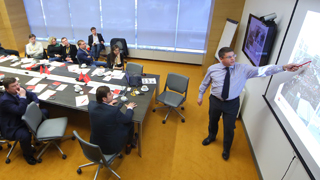
Sozialer Dialog
Sozialer Dialog kann als Verhandlungen, Beratungen, gemeinsame Maßnahmen, Diskussionen und Informationsaustausch unter Beteiligung von Arbeitgebern und Arbeitnehmern definiert werden. Ein gut funktionierender sozialer Dialog ist ein Schlüsselinstrument für die Gestaltung der Arbeitsbedingungen, wobei eine Vielzahl von Akteuren auf verschiedenen Ebenen beteiligt sind. Er sorgt für einen Ausgleich der Interessen von Arbeitnehmern und Arbeitgebern und trägt zu wirtschaftlicher Wettbewerbsfähigkeit und zum sozialen Zusammenhalt bei.
Die jüngsten politischen Debatten auf EU-Ebene haben gezeigt, dass insbesondere seit der Krise im Jahr 2008 in den neu geführten Diskussionen über soziale Gerechtigkeit, Demokratie, Qualität der Arbeit und neue Modelle für die Arbeitsbeziehungen die traditionellen Arbeitsbeziehungen und Systeme des sozialen Dialogs infrage gestellt werden.
Dreißig Jahre nach der historischen Eröffnung des europäischen sozialen Dialogs in Val Duchesse in Brüssel brachte die Kommission mit einer hochrangigen Veranstaltung, die am 5. März 2015 stattfand und an der Sozialpartnerorganisationen aus ganz Europa teilnahmen, den Prozess eines Neubeginns des sozialen Dialogs auf den Weg. Der europäische soziale Dialog ist ein Instrument der EU-Sozialpolitik, das direkt zur Gestaltung des EU-Arbeitsrechts und der EU-Arbeitspolitik beiträgt.
- Veranstaltung der Europäische Kommission: Neubeginn des sozialen Dialogs
- Blogartikel von Eurofound: Von Val Duchesse bis Riga: Wie kann der soziale Dialog wiederbelebt werden?
















